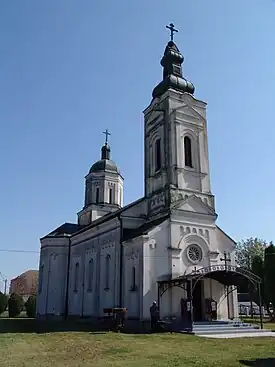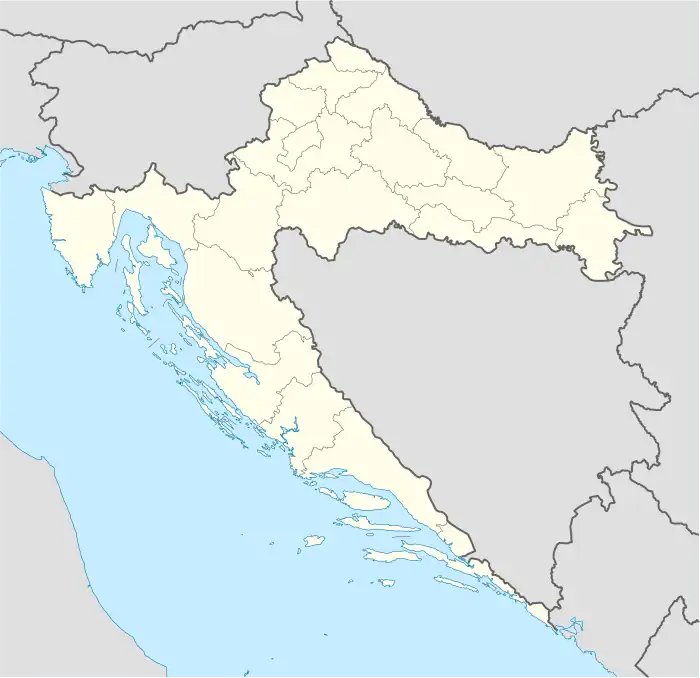Jasenovac, Sisak-Moslavina County
Jasenovac (Croatian pronunciation: [jasěnoʋat͡s]) is a village and a municipality in Croatia, in the southern part of the Sisak-Moslavina County at the confluence of the river Una into Sava. In Croatian and Serbian word "jasen" means ash tree and the name Jasenovac means "ashen, or made of ash tree".[3] During World War II, it was the site of the Jasenovac concentration camp.

Jasenovac | |
|---|---|
| Općina Jasenovac Municipality of Jasenovac | |
 Monastery Jasenovac | |
Location of Jasenovac in Croatia | |
 Jasenovac | |
| Coordinates: 45°16′N 16°55′E | |
| Country | |
| County | |
| Government | |
| • Mayor | Marija Mačković (HDZ) |
| Area | |
| • Municipality | 163.9 km2 (63.3 sq mi) |
| • Urban | 58.2 km2 (22.5 sq mi) |
| Population (2021)[2] | |
| • Municipality | 1,559 |
| • Density | 9.5/km2 (25/sq mi) |
| • Urban | 525 |
| • Urban density | 9.0/km2 (23/sq mi) |
| Time zone | UTC+1 (CET) |
| • Summer (DST) | UTC+2 (CEST) |
| Website | opcina-jasenovac |
Demographics
In 1991, the total population was 3,599, Croats made up 2,419 (67.21%), while Serbs were noticeable population with 911 (25.31%). In 2001, the municipality's population was 2,391, composed of 2,179 (91%) Croats and 141 Serbs (5.90%).
In 2011, the total population was 1,997, with 1,807 (90.49%) Croats and 152 Serbs (7.61%).[4]
The municipality of Jasenovac consists of 10 villages:
- Drenov Bok - 143
- Jasenovac - 780
- Košutarica - 282
- Krapje - 179
- Mlaka - 30
- Puska - 321
- Tanac - 167
- Trebež - 77
- Uštica - 214
- Višnjica Uštička - 198
Austro-Hungarian 1910 census
According to the last Austro-Hungarian 1910 census, municipality of Jasenovac had 8,773 inhabitants which were ethnically and religiously declared as follows:[5]
| Population by ethnicity | Total | Croats | Serbs | Germans | Czechs | Hungarians | Italians | Ruthenians | Slovenes | Note[6] |
|---|---|---|---|---|---|---|---|---|---|---|
| Drenov Bok | 922 | 919 | 3 | 0 | 0 | 0 | 0 | 0 | 0 | It consisted of two hamlets: Bumbekovača (pop. 9) and Drenov Bok (pop. 913). |
| Jasenovac | 2,365 | 1,338 | 975 | 33 | 8 | 8 | 0 | 2 | 1 | It consisted of two hamlets: Jasenovac (pop. 2,327) and Lončarice (pop. 38). |
| Košutarica | 802 | 801 | 0 | 0 | 0 | 1 | 0 | 0 | 0 | |
| Krapje | 1,080 | 1,072 | 3 | 1 | 2 | 0 | 1 | 0 | 1 | |
| Mlaka | 1,176 | 37 | 1,138 | 1 | 0 | 0 | 0 | 0 | 0 | It consisted of two independent settlements: Mlaka (pop. 823) and Jablanac Jasenovački (pop. 353) with two hamlets: Jablanac Jasenovački (pop. 350) and Jasenovački Strug (pop. 3). |
| Puska | 832 | 797 | 29 | 0 | 0 | 0 | 6 | 0 | 0 | Together with a settlement of Trebež. |
| Tanac | 182 | 173 | 9 | 0 | 0 | 0 | 0 | 0 | 0 | At the time of Census it was hamlet of the settlement of Uštica. Independent settlement from 1948. |
| Trebež | 0 | 0 | 0 | 0 | 0 | 0 | 0 | 0 | 0 | It was a hamlet of the settlement of Puska from 1948 as Trebež Krapjanski, and from 1953-1981 as Trebež Puščanski. Independent settlement from 1981. For Census data see: Puska. |
| Uštica | 1,194 | 492 | 702 | 0 | 0 | 0 | 0 | 0 | 0 | It consisted of three hamlets: Klenov Bok (pop. 7), Uštica (pop. 1,077) and Uštička Gradina (pop. 110). |
| Višnjica | 180 | 180 | 0 | 0 | 0 | 0 | 0 | 0 | 0 | At the time of Census it was hamlet of the settlement of Uštica as Višnjica Uštička. Independent settlement from 1948. |
| Total | 8,733 | 5,809 (66.51%) | 2,859 (32.73%) | 35 (0.40%) | 10 (0.11%) | 9 (0.10%) | 7 (0.08%) | 2 (0.02%) | 2 (0.02%) |
| Population by religion | Total | Roman Catholics | Eastern Orthodox | Jews | Eastern Catholics |
|---|---|---|---|---|---|
| Drenov Bok | 922 | 919 | 3 | 0 | 0 |
| Jasenovac | 2,365 | 1,380 | 979 | 4 | 2 |
| Košutarica | 802 | 801 | 0 | 0 | 1 |
| Krapje | 1,080 | 1,074 | 3 | 3 | 0 |
| Mlaka | 1,176 | 38 | 1,138 | 0 | 0 |
| Puska | 832 | 803 | 29 | 0 | 0 |
| Tanac | 182 | 173 | 9 | 0 | 0 |
| Trebež | 0 | 0 | 0 | 0 | 0 |
| Uštica | 1,194 | 489 | 702 | 3 | 0 |
| Višnjica | 180 | 180 | 0 | 0 | 0 |
| Total | 8,733 | 5,857 (67.06%) | 2,863 (32.78%) | 10 (0.11%) | 3 (0.03%) |
Note: 1910 census was based on language and religion, without question about ethnicity. Croatian and Serbian language were presented as one language: Croatian or Serbian. Croat and Serb ethnicity here is based on religion. Roman Catholics and Eastern Catholics (also Protestants and Jews) which language was Croatian or Serbian are presented as Croats, and Eastern Orthodox which language was Croatian or Serbian are presented as Serbs. Other ethnic groups are presented based on their language. That time Ruthenians presented together modern days ethnicities of Ukrainians and Rusyns. Jews were presented only as religious group.
Politics
Minority councils and representatives
Directly elected minority councils and representatives are tasked with consulting tasks for the local or regional authorities in which they are advocating for minority rights and interests, integration into public life and participation in the management of local affairs.[7] At the 2023 Croatian national minorities councils and representatives elections Serbs of Croatia fulfilled legal requirements to elect 10 members minority council of the Municipality of Jasenovac but with only 6 members being elected in the end.[8]
History
The Ottomans conquered Jasenovac in 1536 and that is the first mentioned of the little town Jasenovac.[9]
In the late 19th and early 20th century, Jasenovac was part of the Požega County of the Kingdom of Croatia and Slavonia.
Jasenovac attained tragic notoriety during the Holocaust through the Jasenovac concentration camp giving its name to the Ustaša complex of WWII concentration camps.
During the Croatian War of Independence, in 1991, Serb forces destroyed the local three-way bridge over the Una and the Sava linking the town to Bosnia and Herzegovina. The area was subsequently mined. During the retreat of 1st Krajina Corps in 1992 from area of Jasenovac looting and burning of Serb houses was recorded and this problem was discussed by regional council of SAO Western Slavonia. While in May 1993 Government of Republic of Serbian Krajina was informed by the local residents that 18 corps of Serbian Army of Krajina which are located in Jasenovac continue with burning of the houses, also they destroyed buildings and documentation of Jasenovac concentration camp.[10] The town was taken over by Croatian forces as part of Operation Flash on 1 May 1995.
In 2005, a new three-way bridge was opened with financing from Croatia and the European Commission.[11] Demining operations in the area were ongoing in 2009.[12]
Jasenovac is underdeveloped municipality which is statistically classified as the First Category Area of Special State Concern by the Government of Croatia.[13]
Culture
Jasenovac is home to a library with over 10,000 items.[14] Jasenovac celebrates May 1, the day of its liberation as part of Operation Flash, as its municipal holiday.[15]
The village of Krapje in the Jasenovac municipality houses the headquarters of the Lonjsko Polje Nature Park: the largest protected wetland in Croatia.[16]
Sport
The municipality is home to the football club NK Jasenovac.
Notable people
References
- Register of spatial units of the State Geodetic Administration of the Republic of Croatia. Wikidata Q119585703.
- "Population by Age and Sex, by Settlements, 2021 Census". Census of Population, Households and Dwellings in 2021. Zagreb: Croatian Bureau of Statistics. 2022.
- Logos, Aleksandar A. (2022). "Jasenovac in Croatia or a short story about a war and mass killing in it". p. 28 with footnote 88. Retrieved 2023-01-28.
- "Population by Ethnicity, by Towns/Municipalities, 2011 Census: County of Sisak-Moslavina". Census of Population, Households and Dwellings 2011. Zagreb: Croatian Bureau of Statistics. December 2012. Retrieved 2013-08-12.
- Book: "Ethnic and religious composition of population of Croatia, 1880-1991: by settlements", author: Jakov Gelo, publisher: Zagreb, Croatian bureau of statistics, 1998., ISBN 953-6667-07-X, ISBN 978-953-6667-07-9;
- Book: "Settlements and population of Socialist Republic of Croatia 1857-1971", author: Mirko Korenčić, publisher: Zagreb, Croatian bureau of statistics, 1979.
- "Manjinski izbori prve nedjelje u svibnju, kreću i edukacije". T-portal. 13 March 2023. Retrieved 10 June 2023.
- "Informacija o konačnim rezultatima izbora članova vijeća i izbora predstavnika nacionalnih manjina 2023. III. SISAČKO-MOSLAVAČKA ŽUPANIJA" (PDF) (in Croatian). Državno izborno povjerenstvo Republike Hrvatske. 2023. p. 20. Retrieved 11 June 2023.
- Logos, Aleksandar A. (2022). "Jasenovac in Croatia or a short story about a war and mass killing in it". p. 28 with footnote 88. Retrieved 2023-01-28.
- Janja Sekula Gibač; (2014) Deployment of UNPROFOR and (un)achieved demilitarisation in the occupied territories of Western Slavonia in 1992 p. 300-301
- "Predsjednik Vlade na otvorenju mosta u Jasenovcu". Archived from the original on July 17, 2011.
- Novi projekt razminiranja u Općini Jasenovac Archived 2011-09-28 at the Wayback Machine [New de-mining project in the Municipality of Jasenovac], Croatian Mine Action Centre, 23 June 2009.
- Lovrinčević, Željko; Davor, Mikulić; Budak, Jelena (June 2004). "AREAS OF SPECIAL STATE CONCERN IN CROATIA- REGIONAL DEVELOPMENT DIFFERENCES AND THE DEMOGRAPHIC AND EDUCATIONAL CHARACTERISTICS". Ekonomski pregled, Vol.55 No.5-6. Archived from the original on 2018-08-18. Retrieved 25 August 2018.
- Desetljeće rada Narodne knjižnice Jasenovac, Vjesnik
- "Jasenovac: Uz "Bljesak" i Dan općine Jasenovca". Archived from the original on 2010-10-28. Retrieved 2010-04-12.
- "Lonjsko Polje Nature Park". Archived from the original on 2014-09-10. Retrieved 2014-09-09.